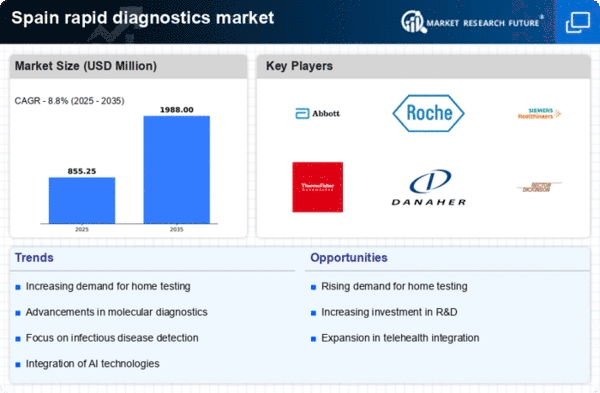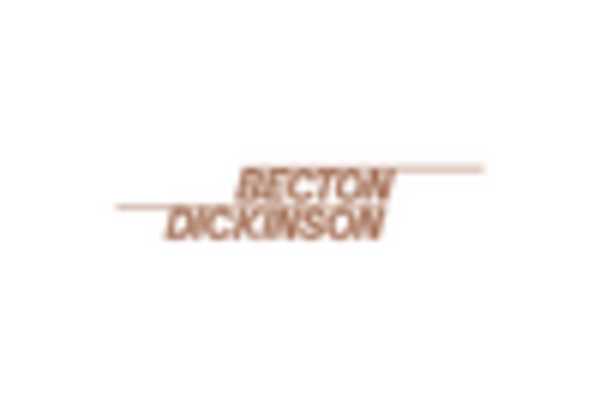Growing Healthcare Expenditure
The increasing healthcare expenditure in Spain is a pivotal driver for the rapid diagnostics market. As the government allocates more funds towards healthcare, the demand for efficient diagnostic tools rises. In 2025, healthcare spending in Spain is projected to reach approximately €200 billion, reflecting a growth of around 5% from previous years. This financial commitment enables healthcare facilities to invest in advanced diagnostic technologies, thereby enhancing patient care. The rapid diagnostics market benefits from this trend, as hospitals and clinics seek to improve their diagnostic capabilities. Furthermore, the emphasis on preventive healthcare and early disease detection aligns with the growing expenditure, suggesting a robust future for rapid diagnostics.
Supportive Government Policies
Supportive government policies are fostering growth in the rapid diagnostics market. The Spanish government has implemented various initiatives aimed at enhancing healthcare infrastructure and promoting innovation in diagnostics. In 2025, funding for research and development in the healthcare sector is expected to exceed €500 million, which will likely benefit the rapid diagnostics market. These policies not only encourage the development of new diagnostic technologies but also facilitate their integration into healthcare systems. As a result, the market is poised for expansion, driven by a favorable regulatory environment that supports innovation and accessibility in diagnostics.
Rising Incidence of Infectious Diseases
The rising incidence of infectious diseases in Spain is significantly impacting the rapid diagnostics market. With an increase in cases of diseases such as influenza and other viral infections, there is a heightened need for rapid testing solutions. The rapid diagnostics market is responding to this demand by developing innovative testing methods that provide quick results. In 2025, it is estimated that the market for infectious disease diagnostics will account for over €1 billion in Spain, indicating a strong growth trajectory. This trend underscores the importance of rapid diagnostics in managing public health and controlling outbreaks, thereby driving further investment in this sector.
Technological Integration in Healthcare
The integration of advanced technologies in healthcare is transforming the rapid diagnostics market. Innovations such as artificial intelligence (AI) and machine learning are being utilized to enhance diagnostic accuracy and speed. In Spain, the adoption of these technologies is expected to increase by 30% in the next few years, indicating a shift towards more efficient healthcare solutions. The rapid diagnostics market is at the forefront of this technological revolution, as healthcare providers seek to leverage these advancements to improve patient outcomes. This integration not only streamlines the diagnostic process but also reduces costs, making rapid diagnostics more accessible to a broader population.
Increased Focus on Personalized Medicine
The growing emphasis on personalized medicine is reshaping the landscape of the rapid diagnostics market. As healthcare providers aim to tailor treatments to individual patient needs, the demand for precise diagnostic tools rises. In Spain, the market for personalized medicine is projected to grow by 25% annually, reflecting a shift towards more individualized healthcare approaches. The rapid diagnostics market plays a crucial role in this evolution, as accurate diagnostics are essential for effective personalized treatment plans. This trend suggests that the future of healthcare in Spain will increasingly rely on rapid diagnostics to ensure optimal patient care and treatment efficacy.
















